On the Trail of the Insane Clown Posse: A Herb Sundays' Sunday Edition
A Herb-That-Didn't-Happen™ by Sam Valenti IV
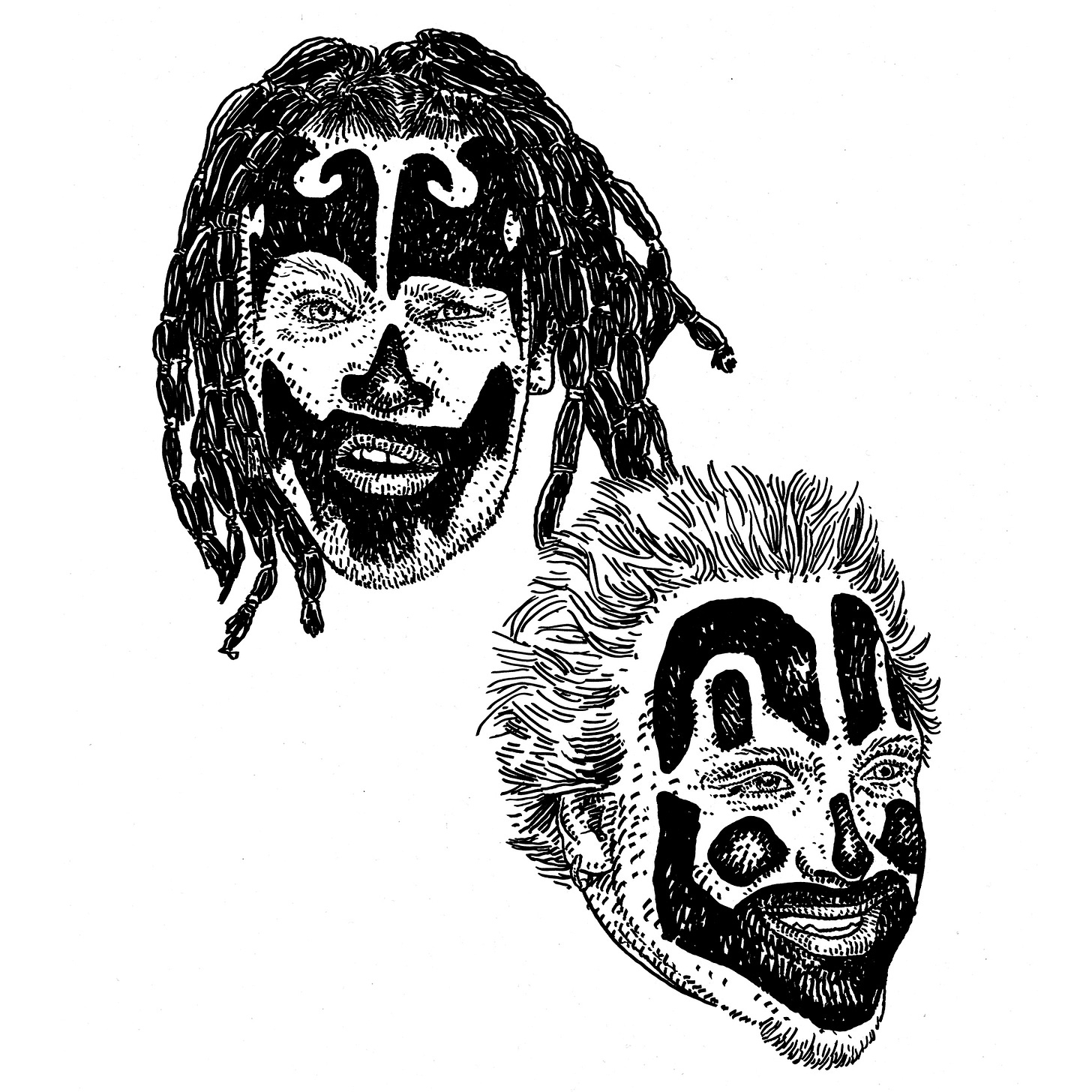
‘The thing everybody got wrong about ICP is that they were always more of a phenomenon than a band, in that they essentially re-imagined what “success” for an indie artist could look like, spectacularly. They didn’t make records, they made a series of “Joker’s Cards.” They built a fan base that became a cultural reference point, their own annual festival, their own merch warehouse, even their own wrestling league—after wrestling and performing in every major league (WWF, WCW, ECW). And they did all this despite relentlessly dismissive critics and an openly hostile music industry that never seemed to get past the fact that they were white guys rapping in clown make-up about killing people.’
- Hobey Echlin for Herb Sundays, 2025
There is no new playlist this week (though you can scroll to the bottom for Violent J’s fave albums), but I’m using this as an ongoing sketchpad this year if you want to follow along: Apple Music, Spotify Art by
.Now, back to the story.
This is the story of a Herb that didn’t happen.
A while back, I tried to reach out to the two members of the Insane Clown Posse (ICP), the veteran Michigan rap group, for a Herb playlist. I’m not sure what I’d find, and I hadn’t listened to a full ICP song since middle school, but they hold sway in a darkened corner of my brain, and I wanted to use this space to explore it.
Before you assume I’m goofing, I’m not. I don’t endorse their discography or even have a take on the quality or content of the group. At an advanced age, I actually admire the fact that their music and output are impenetrable to people like me. Juggalo culture, their fandom that relishes being unloveable and deplorable (though the band has a strong anti-racist, inclusive stance), celebrates NOT being glamorous, famous, wealthy, or even exceptional; they relish in their unimpressiveness. All of it: The merchandise, the Gathering (their annual festival), and the clown face paint, is seemingly one of the last 20th Century American subcultures that still feels un-exploitable by any bigger commercial engine. Many have tried, and few have succeeded.
As writer W. David Marx (Herb 53) explored in his 2022 book Status and Culture: How Our Desire for Social Rank Creates Taste, Identity, Art, Fashion, and Constant Change, the switching costs to be a true Juggalo, like any real subculture, are intentionally high:
Unambiguous distinction requires tall fences, and there must be high signaling costs to keep out normies. Subcultural and countercultural styles require significant expenditures of time, money, and reputation… When groups have anticommercialist tendencies, like punks and hippies, the requirements may instead focus on extravagant changes to appearance, such as body piercings and mohawks. Members themselves don’t see their lifestyles as mere counterimitations, but perceive them as direct expressions of personal feelings. Over time rebellious styles eventually become conventional within alternative status groups and, at that point, members must adhere to them to receive normal status. To be a Juggalo—a fan of the music group Insane Clown Posse—members are expected to dress in oversized red and black garments, drink large quantities of low-priced Faygo soda, tattoo the band’s Hatchetman logo on their bodies, and greet fellow Juggalos with the salute “whoop whoop.”
Just as the wealthy have cultural capital, subcultures develop subcultural capital. There is a correct way of being a Juggalo just as there’s a correct way of being Old Money. Upon visiting the Gathering of the Juggalos music festival, the non-Juggalo writer Kent Russell noted the ubiquity of the Hatchetman logo…Russell, by contrast, lacked this subcultural capital: no Hatchetman tattoo and no familiarity with the right way to say “whoop whoop.” He quickly fell to the lowest status within the Juggalo micro-society and spent his days under “showers of refuse” as festivalgoers constantly threw garbage at him. Alternative status groups may represent an escape from the primary social hierarchy, but they’re not an escape from status structures in general.

What I admire in the ICP taste world is that fan focus, that camaraderie between performer and audience, one you can track to other eccentric outfits across time from the Dead to Phish or in the powerful back-and-forth between fans and performers in pro wrestling. The Midwest of it all is partially why I’ve paid attention, coupled with their absurd willingness to make it in the world. I encountered them around the age of eleven, the perfect age for their sound, and owned a couple of their CDs: Bold, puerile documents they distributed and marketed locally.
I am still struck by the steely homemade minimalism of the Ringmaster sleeve (I believe my CD booklet had gold foil on black ink). It is as totemic in my mind as the art and identity of early Plastikman, all Midwest Modernism meets bonfire charm, somewhere between the city, the suburbs, and the sticks.
To gear up for this, I read chunks of 2003’s Behind The Paint, the autobiography of Violent J, co-written with Hobey Echlin. Echlin, a writer, musician, and DJ, was introduced to me by our mutual friend, the late David “Disco D” Shayman, and is the honor-holder of penning the first-ever review of a Ghostly release in 1999. Echlin lent me the quote at the top of this post. The book is as wild and profane as you’d expect, its a little bit of How-To and a little Self Help (The Secret, etc) told in Violent J’s first person, which, in audio form, is an asymptote of volume and urgency, constantly rising.
Regional rap in Michigan pre-Dilla, Proof, or Eminem, was dominated by theatrics or what Bruce calls “gimmick heavy,” a point of pride. Kid Rock 1.0 (he was less impossibly offensive but just as annoying), ICP, and their biggest influence, Esham, a pioneer of "horrorcore" (he called it “acid rap”) or the rap sub-genre pioneered by Houston's Geto Boys, and fully adopted by ICP (and to some degree Eminem, elements of Odd Future, and even other Michigan-born acts like Salem).
Metro Detroit, for all its toughness and no-nonsense appeal, loves a good gimmick and has helped produce some of the best angle-led acts of the sort, including Madonna, The White Stripes, and Alice Cooper, as well as heralded acts such as Prince and KISS. Like last week’s Herb Kevin Saunderson (Herb 139), Bruce credits The Electrifying Mojo as an inspiration, who, although faceless, formed a powerful persona as well, like other faceless proteges like Underground Resistance. Persona is key to the city, and elsewhere in the Midwest. I’ve had conversations with artist friends from Cleveland whose tough guy fathers were besotted with the arrival of glamour that was part of Roxy Music, for instance.
ICP grew up as pro wrestling and backyard wrestling fans, a subculture that taught them the value of a good schtick and helped them aspire to a wrestling career while making homemade rap tapes. While ICP initially stood for “Inner City Posse,” the group eventually doubled down on their obsession with Esham's macabre and faux demonic nature (he modeled the face paint occasionally). It culminated in their greatest innovation, their look. They were “scrubby ass killer clowns.”
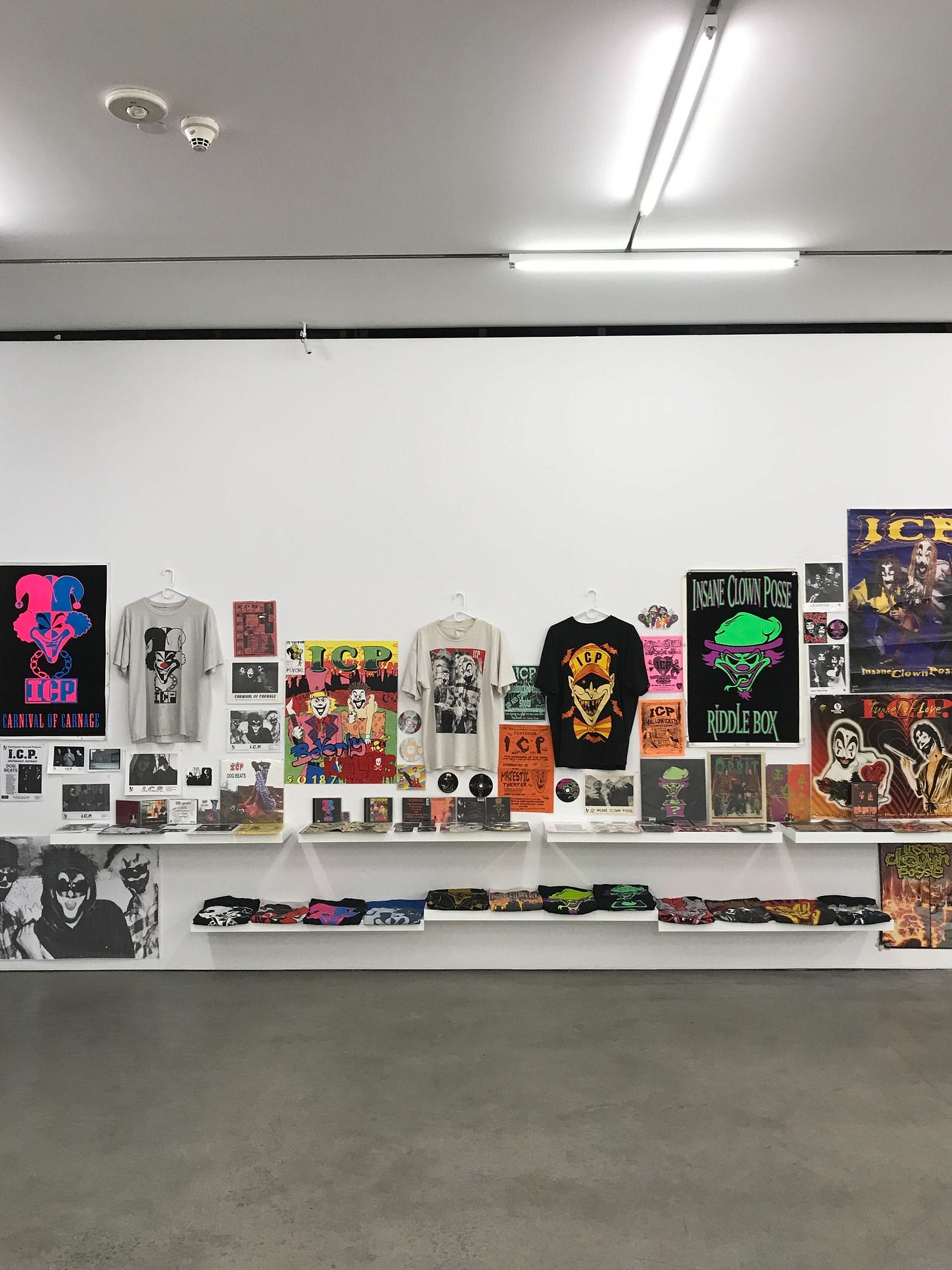
Back in 2018, I happened upon a piece curated by Leo Fitzpatrick (Herb 26) or a tableau of ICP merch, not unlike entering a boy's room or makeshift shrine. Seeing the spread in the little room at the Marlborough Contemporary awakened similar feelings when reading parts of Behind the Paint, which ruminates on vacant lots as cryptic magical spaces, returning to nature from blight or recurring bad dreams (clowns, duh) and other, um, Lynchian inspirations. I then remembered sleepovers in woodsy areas of Michigan, spooky walks, and ghost stories, plus Halloween-week newscasts about Devil’s Night, when arson would rain down on Detroit. Some of it was childhood and elements of a last gasp of pre-internet life, a heady time when imagination was at a premium. Their stories of flyering, endless hours at Kinkos, and their early promotions reminded me of the early days of Ghostly, working alongside Dave Shayman, who also loved a gimmick too and had the same ineffable drive.
While the band hit its mainstream commercial peak at the turn of the millennium, when rap rock and horror found the world’s biggest stages (ICP played Woodstock ‘99, naturally), they've only become more legendary since. They symbolize a form of self-sustained indie greatness and fan service. They were lampooned on SNL (the original video is funnier), and their fans were even falsely identified as a gang around 2010, a moment they fought with the ACLU and helped them add to their fame.
ICP was prescient about a lot of things, good and bad, about America now: The pro wrestling theatrics of politics as entertainment, the need for identity/community in a godless material age, and young white men as an unsavory scourge of the times.
Their turn on the Drink Champs podcast brings home their chaotic appeal. Bruce veers between tears, grateful to finally be "accepted" by Hip-Hop culture. He literally can't help hype up the room. Utsler is less given to hyperbole but trots out key moments (e.g., dropping their buddy Fred Durst on stage)
I think the lesson to be learned from ICP is to just be unabashedly and insanely into what you’re doing. Dave was like that, too. I miss him terribly. They also show that you should champion your weaknesses and make them sing. Bruce even talks about when, as a kid, he called himself and his friends “floobs” as sort of a self-rip that was a stale and crusty, pre-Juggalo loser designation. Herb much?
As time passes, I expect more TikToks or reels attempting to teach me about ICP, as they do with Martin Margiela, acting as if it’s just another marketing plan you can follow, educational fun facts about "world-building" and how the Gathering can teach us about community and other business tips. But these are vestiges of another time and place, borne of desperation and an impossible need to connect.
You can practically taste the Annie Liebovitz ‘Hip-Hop at 60’ spread in Vanity Fair opening with a page on Eminem ("the madman") looking at a steamer trunk full of old props (Clockwork Orange jumpsuit, oversized boxing trunks, a blood-splattered smock), then a very deserving Lil’ Kim ("the brave one"), adorned as a Vegas showgirl getting ready for a gig, and then it’s the ICP boys (“the clown school”), applying their grease paint under vanity lights, tuxedo shirts opened to reveal their tattoos. Finally absorbed into the canon, the last vestige of a world mostly gone.
While Bruce wasn’t hot on atomizing his list into playlist form for me, he did share these….
Music picks from Violent J (Joseph Frank Bruce) for Herb Sundays:
“Honestly there's just so much music I call my favorites. But yeah these are all common on my playlist:
Michael Jackson Off The Wall - Perfect feel good album
Pearl Jam First 5 albums
Nirvana Never Mind
NWA Straight Outta Compton
Esham Judgment Day Night & Day albums
The Doors Essentials Greatest Hits Beach Boys Essentials Greatest Hits Pet Sounds, Smile Alanis Morissette, jagged Little pill Alice N Chains Whole Catalog Weezer Essentials
Greatest Hits Bee Gees Essentials Greatest Hits Smashing Pumpkins Essentials Greatest Hits Prince The Hits Vol 1 & 2 (Anything from Prince is killer tho) Sponge Essentials Greatest Hits Ice Cube Death Certificate West Side Connection Bow Down
Todays artist don't focus on albums as much anymore they just drop a series of singles for the most part these are some of my absolute favorites
Post Malone
Rae Sremmurd
Rick Ross
Lil Wayne”
-Violent J




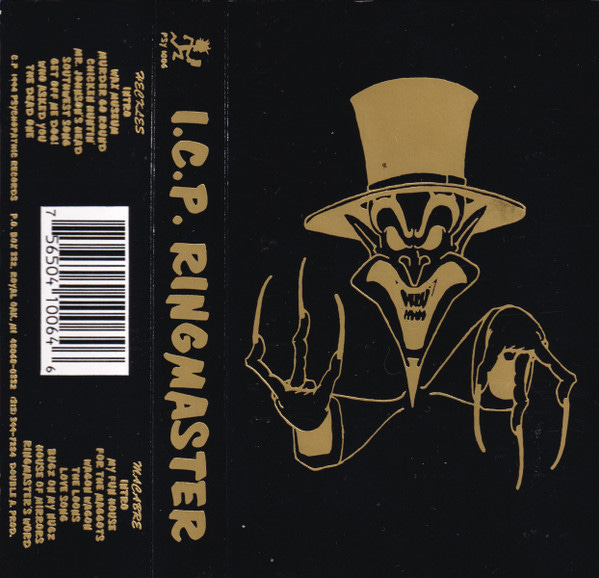
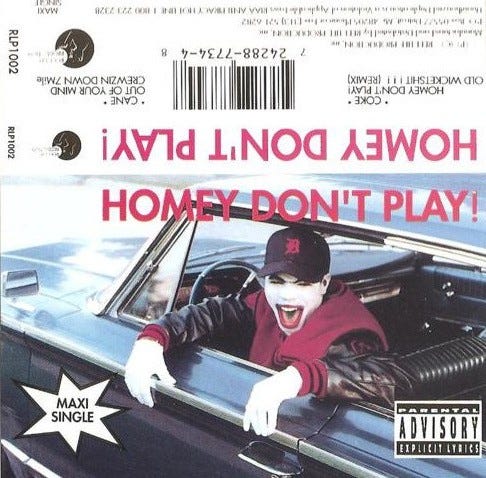
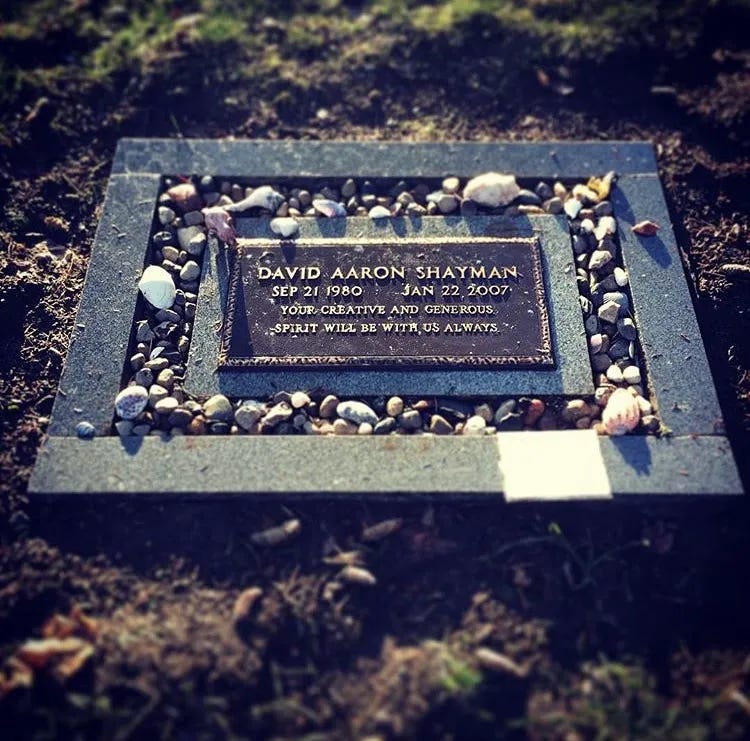
Everything about this post was wonderful & real & captures that naive discovery of identity through music that pulls so many of us into thing. (Music fandom not ICP specifically.) Thank you.